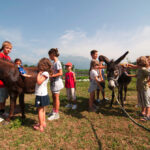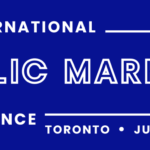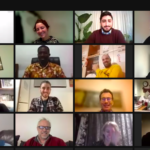Last Thursday, April 21st, we were grateful to attend a virtual event, “Building Sustainable and Resilient Food Systems: Integrating Market Systems at the Centre of Urban Rural Linkages” organized by UN-Habitat, Food and Agriculture Organization of the United Nations (FAO), World Union of Wholesale Markets (WUWM), the World Farmers Market Coalition (WFMC), and the Market Cities Initiative (MCI). This webinar created the space for a number of organizations worldwide, who are dedicated to building a more resilient and sustainable food system, to share their experiences and efforts to build informal and formal markets worldwide, especially amidst the Covid-19 epidemic. Given that there were several speakers and organizations participating, this post will highlight a few of the themes. Please note, we encourage you to read WUWM’s report of the webinar – linked here.
Eugenia Carrara, Secretary General of the World Union of Wholesale Markets, led us into the webinar with a key theme: the cruciality of linking the urban and the rural through integrated planning and policy. This theme of planning ahead together continued throughout the event. One of our founding members and WFMC acting president, Richard McCarthy, joined us from the United States. He presented the visions of the WFMC coalition and reminded us that we should build coalitions to better position ourselves for the future, rather than responding after crises.
We also were fortunate to hear from two vital actors in Bangladesh: John Taylor, Chief Technical Advisor for FAO Bangladesh and Naima Akter, Project Manager for Work for a Better Bangladesh Trust. Taylor highlighted the significant amount of work happening at the local level, but identified that there is still little coordination at the national level. He described their work to bring together multi-level stakeholders, from food councils and associations to vendors,consumers, and the government to consider better ways to share technical expertise. Akter explained their goals of building farmers markets: increasing food access (in terms of both proximity and affordability) and building local economies (eliminating intermediaries and promoting direct selling, and therefore supporting farmer livelihoods). She explained a similar theme around engagement of all stakeholders in their work, from the community, to the farmers, and the government. Like any project, there were both challenges and benefits – ranging from the difficulty of convincing farmers to make this shift to the incredible transformation of a street typically full of trash to a beautiful public space.

João Tiago Carapau, Director General of Lisbon Wholesale Markets in Portugal, explained how the value of wholesale markets was truly realized during the pandemic. Lawrence Dickson-Cobblah, the Focal Person on Food Systems in the Accra Metropolitan Assembly in Ghana discussed how we find ourselves building grand visions of markets, but ultimately, we need to remember the devil is in the details. This came to light especially during the pandemic, with the need to establish protocols for mask-wearing and hand-washing. We were also transported to Kenya, France, Tanzania, Nepal, South Africa, Brazil, and Italy, with input from organizations in each of these countries. We learned so much from this panel from several other organizations and speakers and are so grateful that they took the time to share their thoughts and work with us.
We highly recommend checking out WUWM’s report – linked here! Keep an eye out for future webinars, and take a look into these organizations:
Food and Agriculture Organization of the United Nations (FAO)
Local Governments for Sustainability (ICLEI)
Market Cities Initiative (MCI)
Regions 4 Sustainable Development
Resource Centre for Primary Health Care (Nepal)
São Paulo Agronomic Institute (IAC)
SIMAB – Lisbon Wholesale Markets
Social Development Dept. City of Johannesburg
Tanzania: Livable Cities Project (HealthBridge Project)
United Cities and Local Governments (UCLG)
Work for a Better Bangladesh Trust
World Farmers Market Coalition (WFMC)
World Union of Wholesale Markets (WUWM)

by Christina Ermilio






